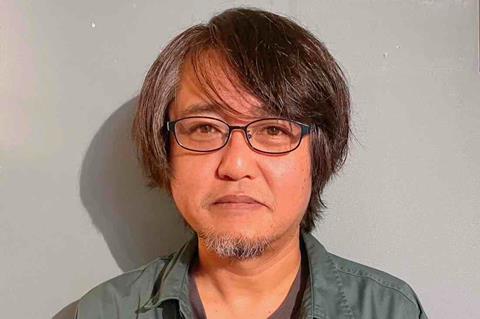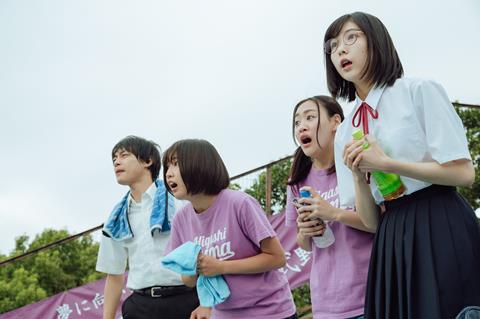
Hideo Jojo may not be a widely recognised name outside of Japan but the prolific filmmaker has more than 100 credits to his name and is the director in focus at this year’s Tokyo International Film Festival (TIFF, October 23-November 1)
Since his debut in 2003, the director has moved from low-budget erotica (known in Japan as “pink film”) to action, romantic comedy, and youth drama. His latest is Passing Fancy, a 46-minute remake of Yasujiro Ozu’s 1933 silent classic of the same name.
TIFF, which is spotlighting Ozu on the 120th anniversary of the iconic Japanese filmmaker’s birth, is also screening four of Jojo’s titles as part of the focus: Twilight Cinema Blues, Believers, Love Nonetheless and On The Edge of Their Seats.
Ahead of the festival, TIFF programming director Shozo Ichiyama said: “One of the reasons we decided to select Jojo Hideo as the director in focus is that his work demonstrates elevated filmmaking and we felt he hasn’t yet been properly recognised outside of Japan. Another reason is that Passing Fancy is really a masterpiece, representing the best of this year’s Japanese film. After this showcase at TIFF, we hope he will start receiving a lot more international exposure.”
Jojo spoke to Screen about the TIFF spotlight, his career to date and his filmmaking philosophy.
Your retrospective at TIFF will feature four films. With a filmography of more than 100 titles, it must have been hard to choose.
The festival suggested three films and I suggested one: Love Nonetheless. That film was well-received by film fans, and it represents a period in my career when I was trying a lot of new things I hadn’t done before. It was co-written with TIFF’s 2022 Japanese director in focus, Rikiya Imaizumi.
What was it like remaking Yasujiro Ozu’s Passing Fancy?
I’ve watched a lot of Ozu myself and I know he has a lot of discerning fans, so I did feel a bit nervous. Passing Fancy is from his silent era, and it’s not as well-known as a lot of his other films, nor does it have the same “Ozu feel” we think of when we think of him today. Remaking it in the modern day and still imbuing it with “Ozu-ness” was something I really had to grapple with.
You made your directorial debut aged 27 with Married Women Who Want A Taste. Was it hard earning the trust of your cast and crew at that young age?
Well, it wasn’t as if those films starred famous actors. It was more a feeling of “this is a small movie, but let’s all try our best”. That’s what helped me make it through. These days, when I work with famous actors, I still get a bit nervous.
What attracted you to the world of pink film?
Pink had something that major films didn’t. A poorer view of the world. The films were also made with a tiny crew, so they had a real handmade feel.
What surprised you about the film industry?
Back in those days, you’d shoot a 60-minute feature on 35mm in three days. That was a shock for me, but that was the normal pink film system. Oh, and you didn’t record sound. You looped all the dialogue later.
Pink films are considered kind of a proving ground for young directors in Japan, right?
Yes, I think that’s still the case. It certainly gave me the chance to make a lot of films and improve my skills. They don’t make as many pink films as they used to, but I do hope the genre can stick for that reason.
After coming up on films that only had three days to shoot, do you find “normal” shooting schedules a breeze?
Well, on larger films, there’s more to do, and more crew members. Recently, there’s been a movement in Japan to improve shooting environments, so I think the really tough working conditions of the past will disappear. Pulling all-nighters and so on really isn’t a good thing, so I hope more sets where everyone goes home at regular hours and gets enough sleep grow in number.

Your 2020 film On The Edge Of Their Seats, one of the titles screening at TIFF, is based on a play.
Yes, a play written by and performed by high school students. I’d never heard of something like that being turned into a film. I went and saw the play while not particularly serious about making the movie, but it really pulled me in, and I decided I really wanted to do it.
In the film, you choose not to show the baseball game in action and just focus on the characters in the bleachers.
In the first draft, the screenwriter added a bit of the baseball game as well as scenes that took place at the school. But I thought that it would be better to preserve what was good about the play by only showing the characters in the stands.
Twilight Cinema Blues is about characters who work at a small indie cinema. Could you relate to them?
I liked how they all love movies, but instead of proclaiming how much they love them, they just kind of assemble at that cinema without much forethought. I’ve recently come to realise I much prefer watching films at a cinema than at home on streaming. In that sense, I find the characters very relatable.
After making more than 100 films, is there a trick to staying flexible and continuing to learn new things?
I’m not really tied to any genre, so I get a lot of varied offers, from comedy to suspense and erotica. I try not to turn projects down, and try things I’ve never done before, even if I’m not sure they’ll go well. If I got an offer from outside Japan, my first instinct would be to think I can’t do it, but I’d give it my best anyway.
This interview was translated from Japanese and edited for clarity.

























No comments yet